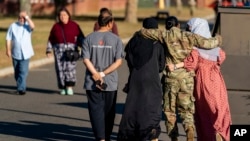The number of Afghans granted Special Immigrant Visas, or SIVs, for resettlement in the United States increased by more than 100% last year, according to new U.S. government data.
In 2023, about 26,500 SIVs were granted to Afghans — more than double the previous year's total of 11,000 and a record since the program's inception in 2008.
A State Department spokesperson confirmed that more than 18,000 SIVs were issued by U.S. consulates worldwide, with several thousand more Afghans having their status adjusted while already in the United States.
From August 2021 to September 2022, the United States offered Temporary Protected Status to tens of thousands of Afghans evacuated by the U.S. military following the collapse of the former Afghan government.
“We have surged resources and significantly increased the number of staff dedicated to Afghan SIV application processing,” the spokesperson wrote in an email to VOA.
The unprecedented surge in SIV issuance comes amid strong demands from veteran and advocacy groups for the speedy resettlement of Afghans who worked for the U.S. military and programs in Afghanistan between 2001 and 2021.
Many activists accuse the Taliban of targeting and detaining SIV-qualified Afghans, even as the United States has continued evacuating SIV applicants under the Taliban rule over the past 2½ years.
Since 2008, nearly 120,000 SIVs have been awarded to Afghans.
As of January, 9,000 principal SIVs remained available, with more than 100,000 applications submitted. Of those, 67,000 awaited approval last year.
To address the backlog, the State Department asked Congress to approve 20,000 additional SIVs last year. The request is still pending.
“The department will not be able to issue SIVs after the numbers allocated by Congress have been exhausted,” said the spokesperson.
Refugees and asylum seekers
The United States has also increased its intake of Afghan refugees and asylum-seekers over the past year, alongside the surge in SIV issuance.
More than 4,600 Afghan refugees were admitted in 2023, marking the highest number in more than two decades, according to figures from the Department of State.
In addition to the SIV program, Afghans, particularly those who worked for civil society organizations before the Taliban’s return to power, can apply to U.S. refugee and humanitarian resettlement pathways from third countries.
“The U.S. government is prioritizing the evacuation and resettlement of SIV cases and very few cases outside of the SIV program have been resettled,” Devon Cone, an expert with Refugee International, told VOA.
Human rights groups accuse the Taliban of implementing misogynistic policies targeting educated women, even those who did not work for the U.S. mission in Afghanistan. Taliban officials have denied such criticism.
“These women almost never qualify for SIVs and very few if any have been resettled,” Cone said.
Since the Taliban’s return to power, hundreds of thousands of Afghans have fled their country fearing the Taliban’s repressive policies and worsening economic conditions.




